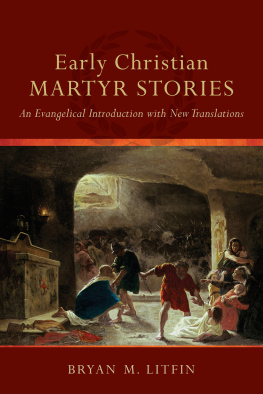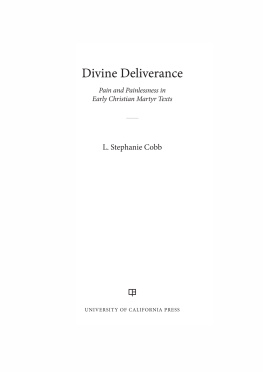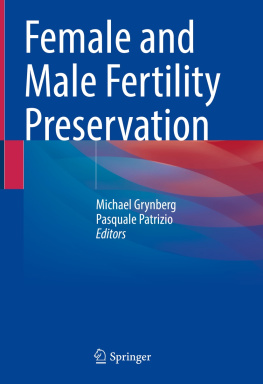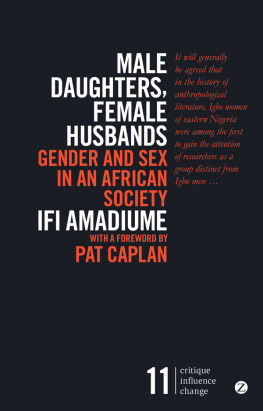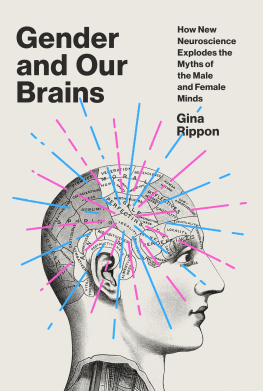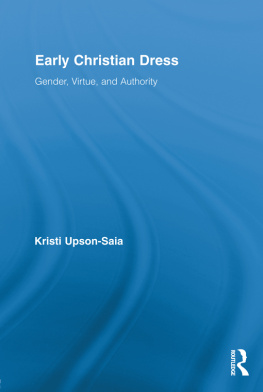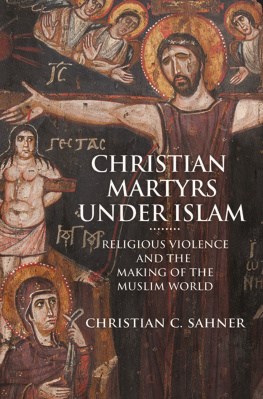Dying to Be Men
GENDER, THEORY, AND RELIGION
Gender, Theory, and Religion
Amy Hollywood, Editor
The Gender, Theory, and Religion series provides a forum for interdisciplinary scholarship at the intersection of the study of gender, sexuality, and religion.
Martyrdom and Memory: Early Christian Culture Making, Elizabeth A. Castelli
When Heroes Love: The Ambiguity of Eros in the Stories of Gilgamesh and David, Susan Ackerman
Abandoned to Lust: Sexual Slander and Ancient Christianity, Jennifer Wright Knust
Naming the Witch: Magic, Ideology, and Stereotype in the Ancient World, Kimberly B. Stratton
L. STEPHANIE COBB
Dying to Be Men
GENDER AND LANGUAGE IN EARLY CHRISTIAN MARTYR TEXTS
Columbia University Press / New York
Columbia University Press
Publishers Since 1893
New York Chichester, West Sussex
cup.columbia.edu
Copyright 2008 Columbia University Press
All rights reserved
E-ISBN 978-0-231-51820-8
Library of Congress Cataloging-in-Publication Data
Cobb, L. Stephanie.
Dying to be men : gender and language in early Christian martyr texts / L. Stephanie Cobb.
p. cm.(Gender, theory, and religion)
Includes bibliographical references (p. ) and index.
ISBN 978-0-231-14498-8 (cloth : alk. paper)
ISBN 978-0-231-51820-8 (e-book)
1. MartyrologiesHistory and criticism. 2. MartyrdomChristianityEarly works to 1800. 3. Sex roleReligious aspectsChristianityHistory of doctrinesEarly church, ca. 30600. 4. Church historyPrimitive and early church, ca. 30600. I. Title.
BR1609.C64 2008
272'.1082dc22
2008005088
A Columbia University Press E-book.
CUP would be pleased to hear about your reading experience with this e-book at .
For my parents,
Sue and Jimmy Cobb
Contents
A friend of mine once suggested that scholars research topics provide intriguing glimpses into their psyches. While I do not know whether this book emerges from a deep-seated martyr complex, I am sure that in its final form it is a testimony to my stubbornness and limitations. Had I been savvier and more capable, I would have implemented more of the critiques and suggestions I have received, and the book would have been the better for it. To borrow words from Marcus Aurelius, It is my fault that I still fail since I did not observe the reminders or teachings.
Chief among those who have tried to teach me is my doctoral advisor and friend, Bart Ehrman, whose questions and criticisms helped refine my arguments and toughened my skin. To him I owe a debt of gratitude that can never be repaid. I also wish to thank Dale Martin, Elizabeth Clark, Zlatko Plese, and Peter Kaufman for their close readings of my work and for their helpful critiques. Under the direction of these individuals, along with many of my professors from Baylor University, Yale Divinity School, and Brite Divinity School, I hope I have become both a better scholar and a better person. I have been extraordinarily lucky to have as friends and conversation partners a group of scholars whose work will, I have no doubt, change the face of early Christian studies. In particular I would like to thank Catherine Chin, Christopher A. Frilingos, Andrew Jacobs, Diane Wudel Lipsett, Pamela Mullins Reaves, Carrie Schroeder, and Christine Shepardson for their insights, criticisms, and, most important, their friendship. I appreciate also my friendships with Lynn Neal, Susan Bales Ridgely, David Shefferman, and Nereida Segura-Rico, all of whom worked extraordinarily hard to keep me relatively sane through this journey. I am thankful for my longtime friend Markie Hart Cooke, whose support has always been steady and unconditional. I am particularly thankful as well for a newer friend, Patrick Alexander, who never doubted me or my work and whose confidence has sustained me of late. I was fortunate to be offered a job at Hofstra University in 2002; there I found not only generous and supportive colleagues but also wonderful friends: Julie Byrne, Anthony Dardis, Markus Dressler, Warren Frisina, Amy Karofsky, Ilaria Marchesi, Anne OByrne, and John Teehan. Special thanks go to my colleague Kathleen Wallace, who has gracefully managed to be both my mentor and my friend. My gratitude extends also to Wendy Lochner, senior executive editor at Columbia University Press, for her interest in my book; to Amy Hollywood, series editor, for her generous support of this project and, especially, for her well-timed words of encouragement; to Christine Mortlock, assistant editor at Columbia University Press, for her helpfulness through the various stages of production; and to Kerri Sullivan, for her diligent work in copyediting the manuscript.
My family has always supported me in my work and, perhaps equally important, taught me the value of laying it aside for a time. I am grateful to them for both. I am especially thankful that over the years my sister and brother-in-law, Melissa and Tom Lacy, and my brother, Chris Cobb, have given me four of the best playmates I could ever hope to have: Benjamin, Jackson, and Adelaide Lacy, and William Cobb. This book is dedicated to my first and best teachers, Jimmy and Sue Cobb, who modeled and fostered intellectual curiosity without limits.
Aristotle, Gen. an. | De generatione anamalium |
Calpurnius Flaccus, Decl. | Declamationes |
Cicero, Att. | Epistulae ad Atticum |
Cicero, Cael. | Pro Caelio |
Cicero, De Or. | De oratore |
Cicero, Leg. | De legibus |
Cicero, Mil. | Pro Milone |
Cicero, Mur. | Pro Murena |
Cicero, Off. | De officiis |
Cicero, Phil. | Orationes philippicae |
Cicero, Quint. fratr. | Epistulae ad Quintum fratrem |
Cicero, Sest. | Pro Sestio |
Cicero, Sull. | Pro Sulla |
Cicero, Tusc. | Tusculanae disputationes |
CIL | Corpus Inscriptionum Latinarum |
Cyprian, Don. | Ad Donatum |
Dio Chrysostom, 1Melanc. | Melancomas i (Or. 29) |
Dio Chrysostom, 2Melanc. | Melancomas ii (Or. 28) |
Eusebius, Hist. Eccl. | Historia ecclesiastica |
Galen, Usefulness | On the Usefulness of the Parts of the Body |
Herm., Sim. | Shepherd of Hermas, Similitudes |
Herm., Vis. | Shepherd of Hermas, Visions |
Horace, Sat. | Satirae |
Ign. Rom. | Ignatius to the Romans |
ILS | Inscriptiones Latinae Selectae |
Josephus, Ant. | Jewish Antiquities |
|




